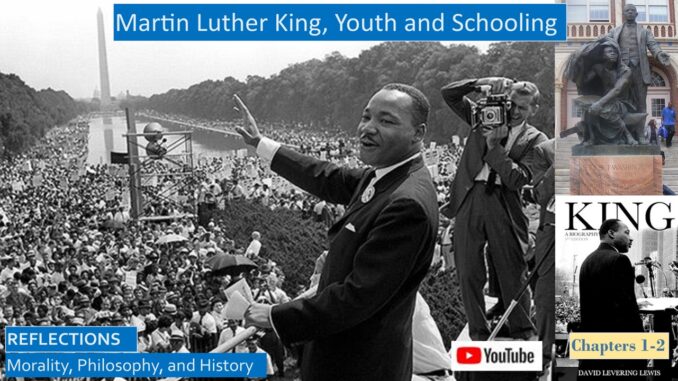
How did the youth and schooling of Martin Luther King prepare him for his civil rights activism?
Was his family involved in the ministry and civil rights struggles?
How did his study of philosophy and the social justice gospel prepare him for his future as a civil rights leader and orator?
In his biography of Martin Luther King, David Levering Lewis quoted Clarence Darrow, the famous defense lawyer in the Scopes Monkey Trial of the Twenties:
“No other offense has ever been visited with such severe penalties as seeking to help the oppressed,”
and Walter Rauschenbusch,
“The championship of social justice is almost the only way left open to a Christian nowadays to gain the crown of martyrdom.”
Powerpoint script, with Amazon book links:
https://www.slideshare.net/BruceStrom1/martin-luther-king-youth-and-schooling-lewis-biography-chapters-1-2
YouTube script for this video: https://youtu.be/_64FMZ6AlEg
MARTIN LUTHER KING AND HISTORY OF CIVIL RIGHTS
Martin Luther King was building on the efforts of prior generations of black leaders. The first generation of black leaders included Frederick Douglass, a former slave who escaped slavery in the 1830’s, and who learned how to read mainly through his own initiative. His oratory inspired black and white abolitionists, and his slave autobiography was a best seller. Many whites at the time had a hard time accepting that a former slave was capable of such an intellectual achievement.
Booker T Washington was a second-generation black leader, he learned how to read after he was emancipated as a teenager at the end of the Civil War. He was asked to organize the Tuskegee Institute, a black trade school. He sought to give blacks a good education in the trades so they could earn both a living and the respect of the white man through thrift and hard work.
Three Generations of Leading Black Leaders, Frederick Douglass, Booker T Washington, and WEB Du Bois
https://seekingvirtueandwisdom.com/three-generations-of-leading-black-leaders-frederick-douglass-booker-t-washington-and-web-du-bois/
https://youtu.be/DAEg463i-Tc
Frederick Douglass Tells Us About His Life as a Slave in his Autobiography
http://www.seekingvirtueandwisdom.com/frederick-douglass-tells-us-about-his-life-as-a-slave-in-his-autobiography/
https://youtu.be/7VkzhyNnuQk
Life and Times of Frederick Douglass, After Slavery as an Abolitionist
http://www.seekingvirtueandwisdom.com/life-and-times-of-frederick-douglass-after-slavery-as-an-abolitionist/
https://youtu.be/M0sx85oMRQA
Up From Slavery: Autobiography of Booker T Washington
http://www.seekingvirtueandwisdom.com/up-from-slavery-autobiography-of-booker-t-washington/
https://youtu.be/yxDnJ6sBoJc
WEB Du Bois, a third-generation black leader, was born during Reconstruction, grew up in Massachusetts, and was granted scholarships to attend college at both Harvard and Berlin, eventually earning a doctorate at Harvard. He was more of a journalist and historian than an administrator, writing a groundbreaking history of Reconstruction that became the dominant historical interpretation in the Civil Rights era of the Sixties.
Not only was WEB Du Bois the editor and main contributor of the NAACP magazine, the Crisis, but he also contributed many articles to the Atlantic, Foreign Affairs, and many other monthly magazines and leading newspapers, shaping public opinion in favor of Civil Rights. Martin Luther King differed in that he was more of an orator than a writer, although he also wrote many magazine and newspaper articles, but oratory was the more important skill in the age of television. His televised speeches and appearances likely reached far more people than did the writings of WEB Du Bois.
Refuting the Lost Cause: Black Reconstruction by WEB Du Bois
http://www.seekingvirtueandwisdom.com/refuting-the-lost-cause-black-reconstruction-by-web-dubois/
https://youtu.be/JeRCM4PAqPk
History of History of WEB Dubois’ Black Reconstruction, Challenging Lost Cause Myth and Dunning School
https://seekingvirtueandwisdom.com/history-of-history-of-web-dubois-black-reconstruction-challenging-lost-cause-myth-and-dunning-school/
https://youtu.be/CK4V3e-TPFU
WEB Du Bois: The Souls of Black Folk, Personal Essays From Reconstruction Era
http://www.seekingvirtueandwisdom.com/web-dubois-souls-of-black-folk-fighting-for-dignity/
https://youtu.be/x212gx1lNIA
WEB Du Bois, Souls of Black Folk, Essays on Alexander Crummel, Black Episcopal Priest, and Sharecropping
https://seekingvirtueandwisdom.com/web-dubois-souls-of-black-folk-essays-on-alexander-crummel-black-episcopal-priest-and-sharecropping/
https://youtu.be/J3TnQyig6Nk
WEB Du Bois was a co-founder of the NAACP. The tensions between Booker T Washington, the Great Accommodationist, and WEB Du Bois, the activist, remain today. Booker T Washington spent much of his time fundraising for Tuskegee and other black colleges, which meant that he could not veer from his accommodationist stance without endangering his funding from wealthy white industrialists in the North.
Although WEB Du Bois was the mouthpiece of the NAACP in its early days, as time passed, their attorney Thurgood Marshall, who later was appointed a Supreme Court Justice, concentrated on challenging the Jim Crow system in the federal courts. As the Civil Rights movement matured, it relied less on white liberals as blacks became more involved in the administration of the civil rights organizations, and the NAACP had to compete with other civil rights organizations. These trends continued as the Civil Rights movement matured during Martin Luther King’s lifetime.
David Levering Lewis also wrote the classic biography of WEB Du Bois. Although his autobiography was a key source for his early years, it is less than helpful and rather throw-together for the latter years of his life.
Autobiography of WEB Du Bois: His Youth, School Years, and Early Career
https://seekingvirtueandwisdom.com/autobiography-of-web-dubois-his-youth-and-school-years/
https://youtu.be/N2ZqixUxPmo
Tensions Between WEB Du Bois and Booker T Washington, Accommodation or Activism?
https://seekingvirtueandwisdom.com/tensions-between-web-du-bois-and-booker-t-washington/
https://youtu.be/Ntjl4xqQSfw
WEB Du Bois and the NAACP, Continuing the Fight For Civil Rights
https://seekingvirtueandwisdom.com/web-du-bois-and-the-naacp-continuing-the-fight-for-civil-rights/
https://youtu.be/MNhkq69CIfo
Was WEB Du Bois a Communist? The Later Years of WEB Du Bois
https://seekingvirtueandwisdom.com/was-web-du-bois-a-communist-the-later-years-of-web-du-bois/
https://youtu.be/YwgrKvIjoc0
YOUNG MIKE, or MARTIN LUTHER KING Jr
Reflecting on this childhood: Although his father preached at a prestigious black Atlanta church, Martin Luther King Jr, called Mike in his childhood, did not want to follow this calling when he first attended college. Initially, Mike dismissed the ministry as not being intellectual, as being too archaic to address contemporary problems.
The biographer David Levering Lewis observes that “the King family belonged to what is known as the school hard preaching, of which cult of personality, and occasional pinch of exploitation, and sulfurous evangelism are indispensable ingredients.” Martin’s maternal grandfather founded the Ebenezer Baptist Church in Atlanta, and his father, Martin Luther King Sr, grew it into one of the largest and most prestigious black Baptist Churches in Atlanta.
His family was known for their involvement with civil rights. After the disastrous 1906 Atlanta race riots, his maternal grandfather was one of the charter members of the local NAACP chapter. He helped defeat a local bond issue that did not fund any new black schools and advocated building Booker T Washington High School, the first black school in Atlanta for secondary education.
His father, Martin Luther King Sr, did not tolerate racial effrontery and particularly did not like being called BOY by policemen. He was resolute, once he beat up his father for drunkenly abusing his mother. Even in the depths of the Depression, when two-thirds of black males were unemployed, he was able to purchase a brick house for his family. His major weakness was that he doted on his three children.
Unlike other smaller Southern cities, there was a sizable black professional class in Atlanta, including professors, businessmen, insurance executives, and professionals like doctors, dentists, and morticians.
Like WEB Du Bois, he discovered that his white playmates distanced themselves from him once they started advancing in school. The parents of two of his white playmates forbade them to associate with him when they were old enough to attend elementary school.
ATTENDING THE BLACK MOREHOUSE COLLEGE
When he enrolled in the black Morehouse College, his first interest was in medicine, a field that he was not temperamentally suited for. Mike developed a love for philosophy, both ancient and modern. He was both attracted and repelled by Marx, but Thoreau’s essay on Civil Disobedience affected him deeply. He then decided to pursue a major in Sociology, much as WEB Du Bois did.
Mike was not involved in student government, though he belonged to the interracial college chapter of the NAACP. He was also active in the oratorical forum and won a prize in oratory. Mike published an article in the school newspaper on The Purpose of Education, where he concluded that “the function of education is to teach one to think intensively and critically. But education which stops with efficiency may prove the greatest menace to society. The most dangerous criminal may be the man gifted with reason but with no morals.”[1]
ATTENDING INTEGRATED CROZIER SEMINARY IN PENNSYLVANIA
A family friend, Reverend Barbour, was an influential alumnus of Crozer Theological Seminary in Pennsylvania, and he suggested that Mike earn a Bachelor of Divinity degree at Crozer. This was a mixed-race school, perhaps at the time it was half-white and half-black, as Dr Wikipedia says its prominent alumni are split between the races. He would occasionally dine at the house of the seminary president. WEB Du Bois had also dined with many professors, as colleges and seminaries had far fewer students then than they do now.
Mike did not want to be seen as a typical Negro by his mixed classmates. Lewis writes, “Mike dressed impeccably,” “and studied relentlessly.” He did not want to be too friendly or smile too much, he did not want to be “thought of as a happy-go-lucky darky.” Mike remembers, “I was well aware of the typical white stereotype of the Negro, that he is always late, that he’s loud and always laughing, that he’s dirty and messy, and for a while, I was terribly conscious of identifying with it.”
In his Psychology of Religious Personalities class, Mike was introduced to Gandhi’s philosophy of nonviolence, and he also read the works of Reinhold Neibuhr. As Lewis writes, “Neibuhr contended that the pacificism of Gandhi could succeed only if the oppressors shared the morality of the oppressed. The British in India were wise, fundamentally decent, and tired. Gandhi’s campaign made sense there.” In the post-war era, enough Southerners had dulled the harsh racial attitudes sufficiently so that real civil rights reform would be possible when confronted by nonviolent protests.
Mike was especially attracted to the Social Gospel of Walter Rauschenbusch, and also Pope Leo XIII’s papal decree of Rerum Novarum, which advocated a balance between capital and labor, so the working man could live in dignity, earning a fair share of profits. This encyclical was the inspiration for the Catholic doctrine of the preferential option for the poor. Mike would later write, “It has been my conviction ever since reading Rauschenbusch that any religion which professes to be concerned about the souls of men and is not concerned about the social and economic conditions that scar the soul is a spiritually moribund religion.”
Mike read many philosophical works and participated in debates in the Philosophical Club. He was distressed over the works of Nietzsche. He intensely studied the works of Karl Marx for some months. As Lewis writes, “Mike was pained by Marxism because it was the most compromising of Christian heresies, arising out of the failure of the Christian church to resist the social exploitation and moral indifference rampant with the growth of industrial capitalism.” Mike wrote, “with all its false assumptions and evil methods, communism grew as a protest against the hardships of the underprivileged.” Unlike WEB Du Bois in his later years, and like many black leaders of his day, Martin Luther King was careful not to seem sympathetic with communism in these Cold War years. For his doctoral dissertation, he investigated the divergent theisms of the theologians Henry Wieman and Paul Tillich.
Like WEB Du Bois, Mike fell in love with a white lady he met in a café. They were planning on getting married, but both sets of parents pleaded with them to call off the marriage because of the immense complications faced by interracial couples. In the Jim Crow era, it would mean that Mike could never serve as a pastor to either a white or black congregation.
Mike was introduced by a friend to his future wife, Coretta Scott. At first, she was reluctant to date someone who was preparing to serve as a minister, but his persistent wooing enticed her to accept his marriage proposal. Although she would later become active in the Civil Rights struggle after his assassination, when she was younger Mike convinced her to concentrate on being a housewife.[2]
In our reflections on Levering David Lewis’ biography of Martin Luther King, we will concentrate on the major iconic events of his struggle for great Civil Rights of blacks, as in the Montgomery Bus Boycott when he rose of national prominence; the bombings and brutality of the Birmingham Boycott, his March on Washington and his I Have a Dream speech at the Reflecting Pool in Washington, DC, the bloody march on Selma, his fight for more equitable housing in Chicago, and finally, when his life was cut short by his assassination.
YT
DISCUSSING THE SOURCES
David Levering Lewis was a professor who lectured in both Ghana and in leading American universities. He was preparing to write a biography of Martin Luther King a year before his assassination, it was published sixteen months later. KING, a Biography, is a joy to read, but since it was one of his first published books, his style of writing falls slightly below that of his biography of WEB Du Bois, which he wrote fifteen years later. After you finish reading his biography, you must read the preface, as it offers additional commentary of the various phases of his life.
One scandal that close examination of his life revealed long after his untimely demise was the undisputable fact that his doctoral thesis was plagiarized. Lewis was disappointed to learn this, he wrote an academic article discussing this topic. Lewis states in the preface of his biography: “A picture emerges of King the young graduate student cavalierly submitting essays and dissertation chapters that were mosaics of the works of others,” which may have been fine had he simply credited them in the footnotes. Lewis concludes: “In retrospect, perhaps I could have been more scrupulous in my assessment of King’s graduate student performance,” as the book went through several editions. “The same should have been true of his apparently delinquent professors,” although plagiarism was harder to catch in a pre-computer age. What makes this plagiarism mystifying is how his professors praised his scholarship. We also know that although Martin Luther King was not only well-read, and that he also took these teachings to heart; but nevertheless, he was not an original thinker, that was not his gift.
Another scandal was Martin’s numerous affairs. These were known during his life, though they were not often mentioned in the press. The FBI discovered them when they wiretapped him, they made sure to tell his family and supporters to damage his reputation. This weakness he shared with WEB Du Bois, and in fact, Du Bois’ second wife was formerly one of his illicit lovers. The lovers of WEB Du Bois were also intellectual admirers of his works, whether that was true for Martin Luther King is hard to say.
In his preface, Lewis also reviews the many biographies that followed his, including the thousands of pages trilogy by Taylor Branch that follows the life and events of all of the civil rights leaders of the day.[3]
[1] David Levering Lewis, KING, a Biography (Chicago, Illinois, University of Illinois Press, 2013, 1970), Chapter 1, pp. 3-26.
[2] David Levering Lewis, KING, a Biography, Chapter 2, pp. 27-45.
[3] David Levering Lewis, KING, a Biography, Preface, pp. xxi-xxiii, and https://en.wikipedia.org/wiki/Martin_Luther_King_Jr._authorship_issues

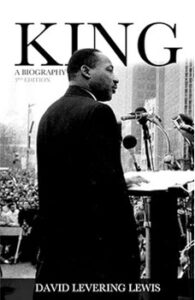
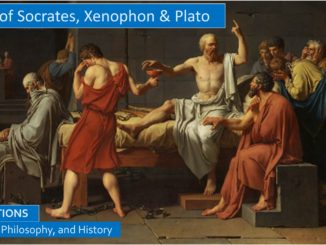
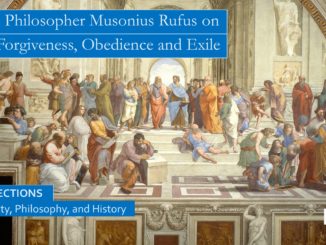
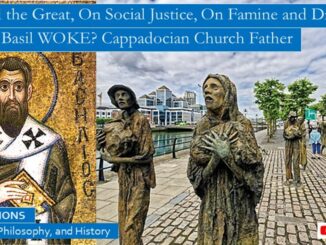
10 Trackbacks / Pingbacks